
views
Developing Your Skills

Get a degree in computer science if you have the time and resources. Attend a university that offers a computer science program if you have the money to pay for it and time to commit to it. Complete and pass all the required courses to earn a degree in computer science that will set you up for a career as a software programmer. If you’re still in high school and thinking about becoming a freelance programmer, you can see if your school has any beginning computer science elective classes.

Learn multiple programming languages. Study to learn at least several of the most in-demand programming languages to open yourself up to a variety of job opportunities. These include Python, Java, JavaScript, PHP, Swift, C#, C Programming, C++, and Ruby. Depending on your time and budget, there are many different ways you can study to learn programming languages. As an alternative to getting a bachelor's degree in computer science, sign up for a programming course at a local technical institute or study online in your spare time.

Improve your communication skills. Work on developing your verbal and written communication skills so you will be better able to communicate with clients. This will help you with everything from networking and getting your first clients to collaborating with clients on projects and delivering exactly what they need in order to retain them. If you’re studying programming in a university or college setting, you could take some public speaking and writing classes to work on your communication skills. If you are studying on your own online, you could look for some free communication courses online as well.

Stay up-to-date on current technologies and the programming industry. Subscribe to online publications or newsletters, take free online courses, and read blogs or news sites related to technology and programming. This will help you stay on top of the latest trends, skills, and programming languages and make you more desirable as a freelancer. You can do a Google search for “programming news” to pull up some of the most popular sites with content related to developer and programmer technology. Then, choose some that you like and add them to your favorites or sign up for their newsletters so you receive industry updates right to your inbox. For example, sites like Developer Tech and Stackify have a lot of software programming news. You can also follow other programmers and tech industry professionals on social media to receive updates.

Develop a strong work ethic. Any type of freelance role requires you to be self-guided, reliable, and results-oriented, which are all parts of a strong work ethic. A good work ethic will ensure you deliver quality work to your clients, which will lead to client retainment and good references to build up your clientele. Some ways you can start building a good work ethic in your day-to-day life are by making work a priority, not procrastinating, turning assignments in on time, and focusing on doing every piece of work well.

Practice being patient. Freelancing is not usually something that becomes a full-time gig right away. It takes a while to land your first client and build up enough clientele to live off of your freelance work, so practice patience, accept that you will face some rejection and disappointment, and know that it will pay off eventually. Many freelance programmers start off freelancing on the side while working another job that pays the bills. Expect that you might have to do this, but continue to develop your programming skills and other personal and professional skills that will help you in your journey to working for yourself as a freelancer.

Choose a niche to specialize in if you want to charge higher rates. Freelance programmers who specialize in certain areas often have opportunities to take on higher paying jobs. Do some research by looking on freelancer sites or job sites to get an idea of in-demand programmer skills and choose an area to focus on developing your skills in it to set yourself apart. For example, you could specialize in a specific code language like CSS, JavaScript, SQL, Python, PHP, or Ruby. You could also specialize in an area like mobile app development.
Marketing Yourself and Finding Clients

Build up some programming experience to gain credibility. Do this by working at a software development company for a while before you start freelancing, taking on small freelance projects, or contributing to open source programming projects. This will provide you with some experience and skills to display in a portfolio and make you look credible to potential clients.Tip: You could even start your own open source project to begin building up experience and credibility that can lead to freelance opportunities down the road. Working for a software development business for a while before freelancing can be beneficial because you will learn other professional skills like project management and can learn further programming skills by working with others who are more experienced than you. An open source project is one for which the source code is available publicly to anyone. There are many open source projects that accept community contributions from other programmers to continuously improve the code.
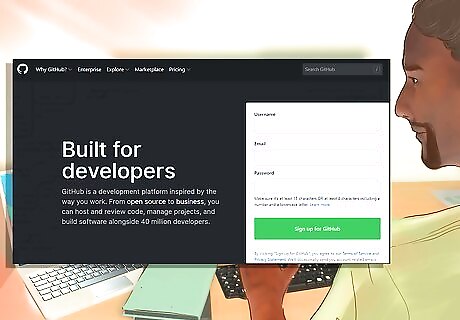
Create an online portfolio of your programming work. Make a website or sign up for an online portfolio site to showcase your successfully completed projects. Include information and relevant links to any projects you worked on during your studies, small freelance projects, and open source projects. A basic personal website with a portfolio on it is highly recommended. Another option is to put code you have written on a Github profile.

Work on creating a personal brand online. Think about how you want to portray yourself and your skills and cultivate this on your personal and professional online profiles. This includes things like sharing photos of a day in the life of a freelance programmer on Instagram, sharing industry articles and thoughts on LinkedIn and Twitter, starting a programming blog, or even creating a YouTube channel with videos related to programming. Be sure all your handles and usernames are the same or similar if you have multiple online presences as part of your personal brand. This way, potential clients can easily look you up and see your different content.

Polish your online professional profiles and keep them current. Update your LinkedIn and any other online professional sites you use with all of your programming education and experience. Include a professional profile picture and link to your online portfolio so potential clients can easily evaluate you. You can also add value to your professional profiles online by writing technical articles about programming projects you’ve worked on or programming in general and either posting them on LinkedIn or on free blogging sites like Medium or Wordpress.
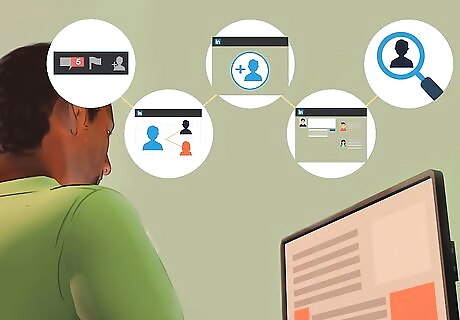
Advertise your services on freelancer sites to find jobs. Sign up for popular freelancer sites like Upwork, Fiverr, and Freelancer. Create profiles that list your experience, skills, rate, and availability. Search for jobs on the sites and send out proposals to try and land your first freelance clients. Using these types of freelance sites is a secure way to start freelancing because they mediate between you and the client and help to ensure you get paid for your work. Make sure that any time you complete a new freelance project, you add it to your online portfolio and all your profiles on freelancer sites.
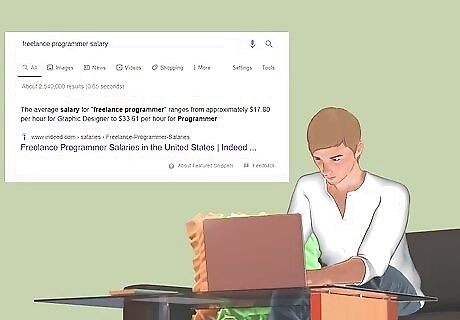
Network online and in real life to find potential clients. Add people you know on LinkedIn and keep an eye out to see if they post about any freelance jobs. Join LinkedIn groups related to programming and post in them to network with people in the industry. Attend any relevant tech community events in your area to meet people in the professional world face-to-face and make connections who might be able to refer you to clients.Tip: Another way to meet people in real life is to lease a desk at a coworking office. There are often startups or individuals who may be in need of a freelance programmers working at coworking spaces that you can connect with. For example, you can look on Meetup or Eventbrite to find tech-related gatherings to attend in your city or nearby. Keep in mind that although in-person networking can take up much more of your time than online networking, it is often more valuable to make real-world connections.
Working with Clients
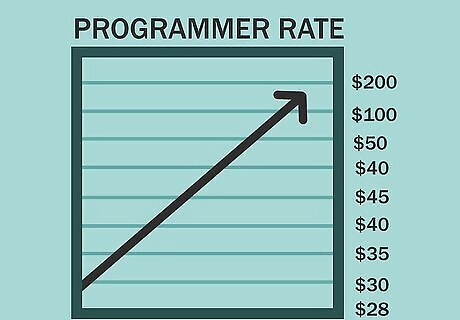
Set fixed rates for your freelance work. Do some research by searching online and talking to other programmers in your area to find out the average hourly or per-project rate for programmers in your geographic location. Take this into account, along with your experience, education, skill set, and personal expenses to choose a rate to charge for your freelance work. Freelance programmers earn anywhere from about $28-$200 USD per hour, but it varies depending on where in the world they are located. If you are just starting out, you might want to pick a rate at the lower end of this scale, but resist the temptation to charge an even lower rate just to get clients. Keep in mind that if you specialize in a certain coding language or development area you can charge more. If you aren’t sure what to charge, you could start at around $36 USD per hour or the equivalent in your currency. This equals an annual salary of about $70,000 USD, which is the average base salary for software programmers.

Define your schedule and the hours you’re available to work. Determine what days and hours you are available to work and communicate this clearly to your clients. Adhere strictly to your own schedule so you are always available during the designated time and in order to manage your time efficiently.Tip: As a freelancer, you might often work with clients in different time zones than you. If this is the case, be clear about when you are available for calls and meetings so communication flows well. When you work as a freelancer, it’s important to be clear about your schedule and availability with both yourself and clients. If not, you might end up taking on more work or projects than you can handle. This can result in a lower quality of work on your end and completely throw off your work-life balance.
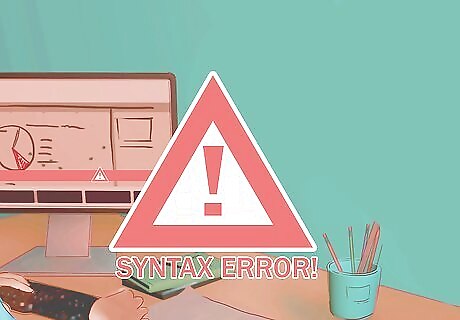
Avoid working on projects you don’t have the right experience for. Don’t accept a job working in a programming language you aren’t familiar with or the quality of work will suffer. Take on projects that you are 100% confident in your ability to complete to the client’s satisfaction. For example, if you aren’t proficient in the Python coding language, don’t accept a freelance project that requires you to fix Python coding errors. If you do unsatisfactory work for a client, you are much less likely to retain them as a client or to receive a good review and recommendation from them that can help you get more clients.

Treat clients with respect and do the best work you can. This includes being respectful of deadlines and turning in quality work on time. Always be respectful and professional in your communication with clients. There are many freelancers for clients to choose from, so it’s important to provide the best services you can to yours. This will set you apart from others and help you retain clients and get good referrals as someone who is respectful, consistent, and turns work in on time.

Use an invoicing system to charge clients and keep track of your income. Send invoices to clients for the work you do and keep copies of all the invoices for tax purposes. Freelancer sites like Upwork have built-in payment systems and records of transaction, so you don’t need to send invoices to clients you get through those types of sites. Keep in mind that as a freelancer you won’t be deducted taxes from any of your payments. It’s recommended to work with a tax professional when it comes time to do your taxes to make sure you are reporting everything correctly and paying the right amount.




















Comments
0 comment